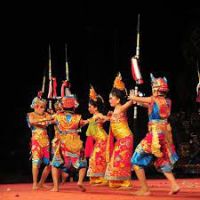Tari Puspa Wresti
From BASAbaliWiki
- Type of Performance
- Dance
- Photo reference
- https://www.google.com/url?sa=i&url=http%3A%2F%2Fblog.isi-dps.ac.id%2Fgedeprianta%2Ftari-puspawresti%2F11357324_1420312358294577_504455449_n&psig=AOvVaw0yUDpJb7JXQEkYBUfz-Hge&ust=1633058910973000&source=images&cd=vfe&ved=0CA0Q3YkBahcKEwj4zLne4KXzAhUAAAAAHQAAAAAQEw
- Genre
- Tari Kreasi Balih Balihan
- Composer
- I Nyoman Windha
- Choreographer
- I Wayan Dibia
- Musicians, group or orchestra
- Sanggar Seni Çudamani
- Singer(s)/Dancer(s) or troupe
- Sanggar Seni Çudamani
- Place of origin
- Singapadu, Bali
- Instruments
- Gamelan Gong Kebyar
- Related Books
- Related Holidays
Videos
Description
In English
In Balinese
In Indonesian
In other local languages
Audios
Photos
Articles







Enable comment auto-refresher